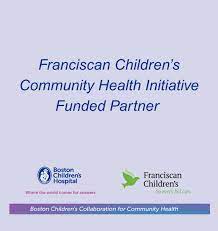Child and Adolescent Mental Health Initiative (CAMHI)
Center for Workforce Development
Meeting the Need, For Children in Underserved Communities
“We do not merely have a social responsibility to assure that our children and youth have decent life chances and prosper. We have a sacred obligation to do so.” —Hubie Jones, Founder, Massachusetts Advocates for Children
 Across the country, many children and adolescents—especially those in under‑resourced
communities—continue to face significant barriers to receiving timely, culturally
responsive mental health support. The William James College Child and Adolescent Mental Health Initiative(CAMHI) is meeting this need by preparing emerging professionals to deliver compassionate,
culturally grounded, and community‑aligned behavioral health services for youth and
families. Through focused training, mentorship, and community-based partnerships,
CAMHI helps expand access to high‑quality care for the young people who need it most.
Across the country, many children and adolescents—especially those in under‑resourced
communities—continue to face significant barriers to receiving timely, culturally
responsive mental health support. The William James College Child and Adolescent Mental Health Initiative(CAMHI) is meeting this need by preparing emerging professionals to deliver compassionate,
culturally grounded, and community‑aligned behavioral health services for youth and
families. Through focused training, mentorship, and community-based partnerships,
CAMHI helps expand access to high‑quality care for the young people who need it most.
Launched in 2019 with generous support from the Boston Children’s Collaboration for Community Health, CAMHI was created to expand access to culturally responsive mental health care for youth in underserved communities. In 2025, additional funding from the Franciscan Children’s Community Health Initiative and Apricus Principle strengthened this mission by supporting graduate students in the Clinical PsyD, Counseling and Behavioral Health, and School Psychology Programs at William James College who are committed to serving children, adolescents, and transitional‑aged youth.
CAMHI Fellows receive intensive training, including specialized didactic seminars, individualized mentoring, career guidance, stipends, and field placements with community-based partners. Each year, the program provides 24 stipends—12 awards of $5,000 for first‑year students and 12 awards of $7,000 for second‑year students—helping aspiring clinicians gain the skills and experiences needed to make a meaningful impact in their communities.
Eligible students will be selected based on the following criteria:
- Demonstrated commitment to serving children, adolescents, and transitional-aged youths with behavioral disorders
- Motivation to work with youth and families in medically underserved communities and primary care settings
- High level of cultural awareness, sensitivity, and responsiveness
- Underrepresentation in the behavioral health field
- Good academic standing
- Language proficiency
Twenty (20) 1st and 2nd year students will be recruited annually from the Clinical, Counseling and Behavioral Health, and School Psychology Departments.
Note: Students who receive other forms of compensation (i.e., stipends or salaries) for their field education experiences are not eligible for this program.
Students who are selected to participate in the CAMHI must meet the following program requirements:
- Complete a one-year field education experience at a training site that serves children, adolescents, and transitional aged youth who reside in high need and high demand areas.
- Provide direct care services (e.g., individual, group, family counseling; consultation) to the target population.
- Meet all field training sites’ expectations (e.g., work hours, direct care services to clients, consultation and collateral contacts, supervisory hours, attendance at multidisciplinary team meetings).
- Participate in mentorship activities, didactic seminars, conferences, and other professional development workshops hosted by the CAMHI staff. Students must be available to attend weekly didactic seminars (e.g., on Wednesdays from 12 to 1:00 p.m.), which will be held via Zoom.
- Remain in good academic standing throughout their participation in the program.
- Adhere to their Field Education departmental requirements as well as program policies and procedures for professional conduct and ethical behavior.
- Actively engage in program evaluation-related activities (e.g., complete surveys and other data collection tools) that are required by the funder.
- Complete and submit Time2Track reports, including detailed client demographic data and training activities, in a timely manner.
- Obtain a National Provider Identifier (NPI) number for data tracking purposes.
- Maintain ongoing communication with the CAMHI staff.
- Complete other tasks, as required by the CAMHI.
While CAMHI has partnered with several organizations to implement the program, this funding opportunity is open to all qualified WJC students who will be working at field placement sites that serve children, adolescents, transitional aged youth and their families. Eligible field training sites include school districts, community health centers, and primary care and integrated behavioral health agencies that are located in underserved communities throughout the Commonwealth of Massachusetts.
The CAMHI grant allows for some additional financial assistance for program participants needing emergency-related funds (e.g., for housing, transportation, and childcare). Throughout the course of the year, CAMHI-supported students may apply for funds, which will be granted on an availability and an as-needed basis.
Students who are interested in applying for the CAMHI need to fill out an application form via Qualtrics and submit a résumé/CV and two letters of recommendation (one of which should be from a clinical supervisor). Applicants must also submit a Free Application for Federal Student Aid (FAFSA) form directly to the WJC Financial Aid Office.
The recruitment period for the CAMHI training program typically starts in the spring (e.g., April/May). The application due date will be published on an annual basis and disseminated to the William James College community via What's Up Monday. Please note that incomplete applications will not be reviewed. It is the responsibility of the applicant to ensure that all required materials are submitted by the deadline.
Completed application materials will be reviewed by the CAMHI faculty. Following a comprehensive application review process, eligible candidates will be invited for an interview with the program faculty. Interviews will be conducted in late spring/early summer and will take place via Zoom. Students will be informed via email of the status of their applications by no later than August.
Note: Candidates who apply to an agency that is not a current CAMHI partner must notify the site of the program’s requirements. All training sites will receive $1,000 per trainee to defray the cost of supervision. New and existing agency partners will be required to sign a Memorandum of Agreement, submit a W-9 form, and document how funds received from the grant are expended.
The Child and Adolescent Mental Health Initiative (CAMHI) is administered by Dr. Gemima St. Louis.
Students: please contact Dr. St. Louis or the Office of Admissions for more information.
Partnership inquiries should be directed to:
Gemima St. Louis, Ph.D.
Vice President for Workforce Initiatives
Center for Workforce Development
William James College
1 Wells Avenue, Newton, MA 02459
Gemima_Stlouis@williamjames.edu
(617) 327-6777 ext. 1241
The CAMHI grant offers a modest honorarium to partnering field training sites to defray supervisory-related expenses. Partner agencies sign a Memorandum of Understanding, agreeing to the terms of the program, and will be required to document how CAMHI funds received by their organizations are expended.

Contact us
For more information about CAMHI please contact:
Gemima St. Louis , PhD, Vice President for Workforce Initiatives and Specialty Training; Professor, Clinical Psychology Program
Email: CAMHI@williamjames.edu
Phone: 617-327-6777 x1241
